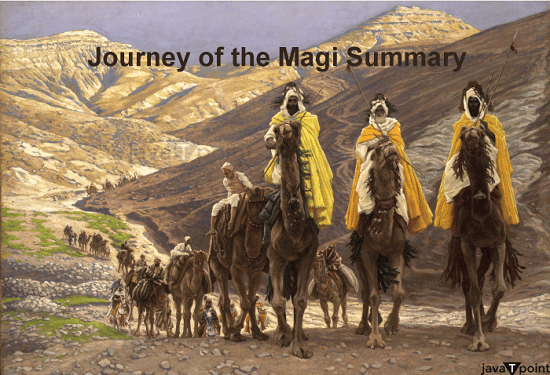Journey of the Magi SummaryIntroduction: About Poem and the Writer
SummaryThe Poem starts with the Magi, regarded as the wise men and kings. They start Their excerpt by describing their conditions while traveling to Bethlehem. They remember and state the problematic conditions they faced on the Bethlehem path. Magi were the wise men or kings who are described as most ferocious as well. The story's details show that their journey to Bethlehem was physically and emotionally challenging. Along their journey, they also have to face many disappointments. They faced this disappointing song while preassuming that they might get good encouragement while on their way, but they had to face a real challenge. When they were still on their journey to Bethlehem, they saw and were visited by a group of people who seemed very unusual to them, but instead, they were also unaware of the facts happening in Bethlehem. When visited by these strangers, the magi people seemed emotional as they remembered how luxurious life they greeted in the past and how much love and emotional well-being they were being offered in their past. Upon understanding how many sacrifices they have made to achieve all that spiritual understanding, they have today. Upon their arrival in Bethlehem, the Magi are confronted with a stark contrast between their lofty expectations and the frank reality of Christ's birth. The speaker describes it as "a cold coming... Just the worst time of the year... For a journey, and such a long journey." These lines emphasize the harshness of their pilgrimage, the unfavorable conditions they endured, and the doubts that begin to creep into their minds. In addition to the disappointment of the physical setting, the Magi also encounter individuals who are oblivious to the momentous event. They encounter innkeepers unaware of the birth's significance and cannot offer proper accommodations. The speaker notes, "with the voices singing in our ears, saying/ That this was all folly," indicating that doubts and skepticism start to infiltrate their thoughts. The Magi's sacrifice and devotion seem misplaced and futile when confronted with the indifference and ignorance of those around them. Furthermore, the Magi face mockery from children who laugh and taunt them. The speaker reflects on their hardships, questioning the purpose of their arduous journey: "Have we led all that way for/ Birth or Death?" This rhetorical question encapsulates the profound doubt and existential crisis the Magi experience. They grapple with the conflicting emotions of questioning the significance of their mission and yearning for a deeper understanding of the purpose behind their travels. Throughout their expedition, the Magi interact with various individuals, including innkeepers unaware of the significance of the birth and children derisively laughing at them. These encounters deepen their sense of isolation and reinforce their doubts about the significance of their pursuit. They question whether they were led on this long and arduous journey to witness birth or death, further highlighting their inner turmoil. Despite their doubts and disillusionment, the Magi experience a transformative moment upon beholding the birth of Christ. The speaker declares, "I should be glad of another death," indicating that witnessing this event has forever changed him. The birth of Christ represents a rebirth of faith and hope and a profound understanding of the importance of pain and sacrifice. It is a life-changing encounter that goes beyond the physical journey and arouses the Magi to a fresh perspective on the holy. The Poem also acknowledges the changes that profoundly got into their life while they were still on their path or journey and strongly impacted them. He acknowledges the unbearable nature of the birth, comparing it to a bitter death, and expresses a sense of alienation upon returning to their familiar surroundings and kingdoms. The magi, regarded as the wisest astrologers, have seen many changes after being with divine or sacred powers. These changes have had a long-lasting and transformative change on these people. In this Poem by T.S. Eliot, the poet masterfully explores the idea of faith, doubt, and change while simultaneously focusing on internal things such as conflicts and obstacles. Masterfully portrays their disillusionment, profound doubts, and the ultimate transformation from encountering the divine. The Poem invites readers to reflect on their beliefs, the complexities of faith, and the transformative power of spiritual journeys.
Next TopicKuttippuram Bridge Poem Summary
|
 For Videos Join Our Youtube Channel: Join Now
For Videos Join Our Youtube Channel: Join Now
Feedback
- Send your Feedback to [email protected]
Help Others, Please Share









